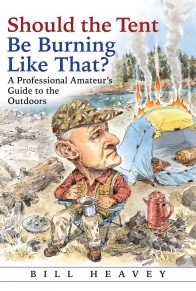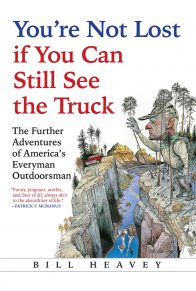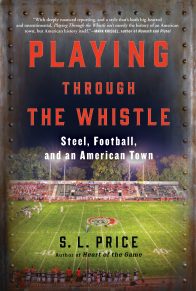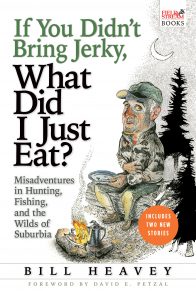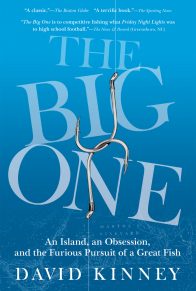“The age-old art of foraging takes Bill Heavey from his back yard to a Louisiana swamp and points beyond. But this is not a tale of trendy table fare. With a healthy dose of skepticism, a dollop of humor, and even a dash of romance, Heavey transforms the typical ingredients of midlife crisis into a surprising feast of renewal, finding true sustenance in nature’s garden.” —Langdon Cook, author of Fat of the Land
“Locavores can be tiresome with their insistence on sourcing (and discussing) everything they put in their precious little mouths. Bill Heavey ran the risk of being a bore in his account of attempting to hunt, fish, grow or forage as much of his food as possible, It’s Only Slow Food Until You Try to Eat It, but escaped thanks to good humor, poking fun at hard-core foodies and himself while still finding merit in the movement. . . . Mr. Heavey takes us back to the joys—and occasional pitfalls—of the humble edibles around us, and his conclusions ring true. The finest things I ever ate, wandering the East Coast with rod and gun for 30 years, were the most local . . . Mr. Heavey reaffirms the value of things small and common that were once treasured but that we now walk by without a passing glance: persimmons, cattails, giant mushrooms, squirrels, morels, dandelions, wild cherries, frogs, crawfish and the whitetail deer that occasionally wander through backyards—at their peril, if it’s Mr. Heavey’s lawn.” —Angus Phillips, The Wall Street Journal
“An engaging autobiography/ersatz primer on how to (or not to) undertake subsistence living in an urban environment. While this title is chock full of facts about nature and industrialized foodways, it’s also a story about friendship and falling in love. VERDICT: Laced with tart humor and spiked with moments of sentimentality, this work makes for a compelling read.” —Library Journal
“Brilliant and incisive . . . It’s Only Slow Food Until You Try to Eat It is gently thrilling and endlessly emblematic of the chaotic way people evolved to become what they are now. The thing about life is that on your way to the hunt, you never know what you’ll gather.” —David Cotner, The VC Reporter
“A humorous tale about a subject that’s often taken too seriously.” —Grub Street
“A book with many layers, it’s refreshing untrendy, and it’s narrated with great humor and honesty.” —Catherine Ramsdell, PopMatters
“Heavey’s bumbling attempts at self-sufficiency are a winning mixture of compelling and hilarious.” —Jake Swearingen, Modern Farmer
“Heavey tells a tale in which a totally normal dude gets a wild hair up his ass about growing, hunting, and foraging for his own food. The trouble—and the delight—is where he lives; not Idaho or someplace rural, but rather inside Washington D.C.’s Beltway. The result is a hilarious and super instructive book . . . Heavey’s experience writing for magazines obviously taught him how to master the skill of keeping the reader’s attention. His dry hilarity on everything from rototilling to the rarely-seen but abundant monkeyface eel marks, makes this book something special.” —Douglas Lord, Library Journal
“Bill Heavey is James Thurber in camouflage overalls, an unrelenting geyser of slapstick comedy and serrated wit. If he doesn’t make you laugh, consult a coroner. In It’s Only Slow Food, however, the comedy is served with heaping sides of pathos, hard-earned insights, and penetrating observations about the way we eat, as Heavey strips away the pretensions of foodieism to concoct an eating philosophy of his own. You will read bits of it aloud to anyone in earshot. But you will also think differently every time you sit down to eat.” —Jonathan Miles, author of Dear American Airlines<
"Bill Heavey is the convivial and erudite hunting/fishing/foraging/trespassing partner you never had–and just as well, because he generally returns from the 'wild' (backyard, park, and—yes—cemetery) bloodied and reeking. His entertaining yet sneakily informative tales will have you rolling in the thistle." —William Alexander, author of The $64 Tomato
“If Bill Heavey felt like it, he could write a book about something as boring as shuffleboard and it’d turn out to be good. He’s just that sharp and funny. But thankfully, in It’s Only Slow Food Until You Try to Eat It, he chooses to write about things that are close to my heart, such as hunting, fishing, and wild food. Whether he’s hanging out with trendy foragers in San Francisco or butchering caribou with indigenous hunter-gatherers in Alaska, he relates his experiences with respect, curiosity, and well-honed humor. Not only is this book perfect for anyone who loves food or the out-of-doors; it’s perfect for anyone who loves a good story, well-told.” —Steven Rinella, author of The Scavenger’s Guide to Haute Cuisine, Meat Eater, and American Buffalo
“The prose of food has over the last few decades evolved into a byzantine network of scenes so precious it feels at times like indie rock, where no matter how many tape swaps and basement shows you go to, you never really feel like you are ‘in the know.’ Enter Bill Heavey, who takes us on his quest of continual discovery and surprise in It’s Only Slow Food Until You Try to Eat It. Bill eats his lawn. Bill chokes out 45 bullfrogs. Bill lands into a run of perch. Bill makes a pie. And, every time, Bill is honest enough to tell us exactly how he did. This is a tale of a leap into the deep-end of extreme foodieism—clumsy, bold, courageous, hilarious, honest, and touching. Bill wrote an onion. The first layer is a funny, witty adventure story. Peel it back, and we’ll find leaf upon leaf of how-to, coming-of-age, consumerist criticism, cultural discovery, plights real and imagined, and ultimately, a love story. Bill has given us all permission to not only discover a new facet of our edible lives, but to enjoy it.” —Duff Goldman, Ace of Cakes





